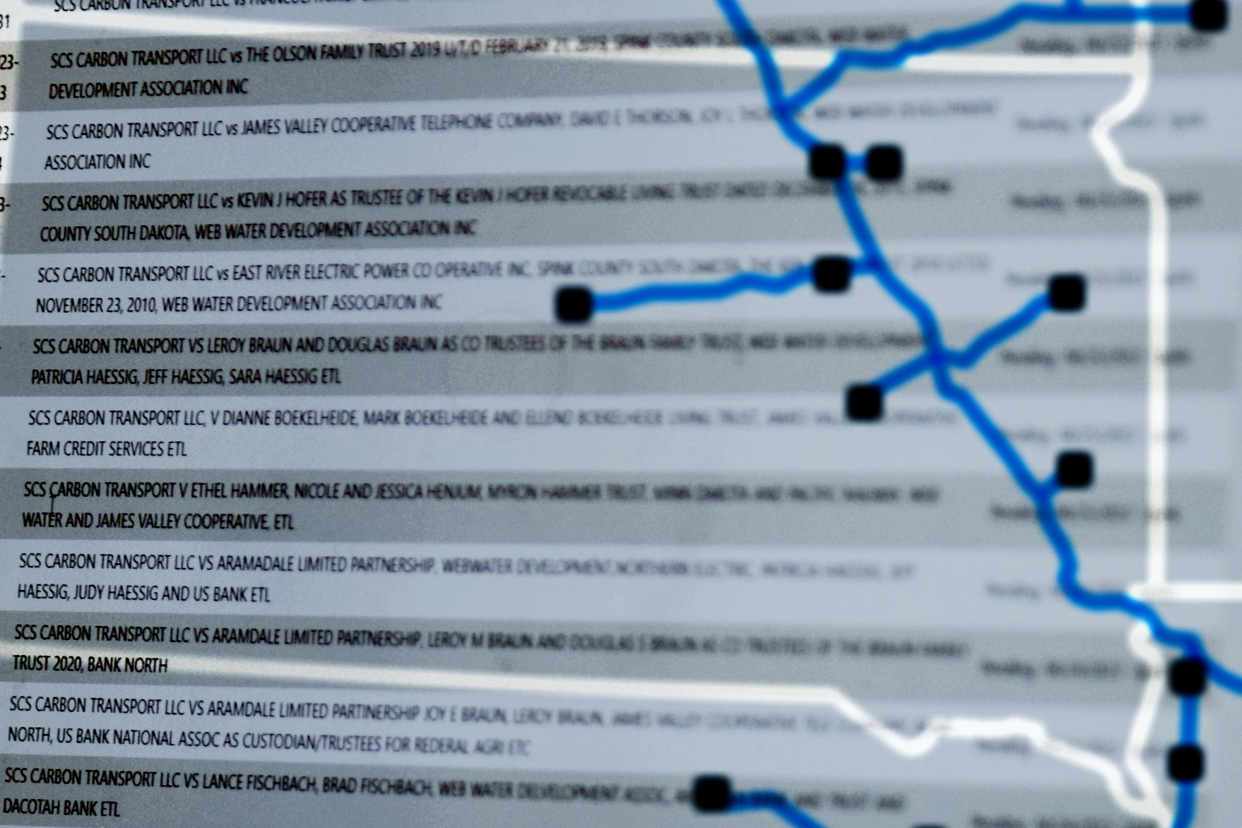Summit files more than 80 eminent domain lawsuits in 9 South Dakota counties

Leroy Braun never thought he would be sued, because he didn't want a pipeline running through the land he owns.
But as of Friday, Braun is one of many South Dakota landowners being taken to court by Summit Carbon Solutions, a CO2 carbon capture company.
Summit has initiated more than 80 lawsuits against landowners in Beadle, Brown, Codington, Edmunds, Hand, Kingsbury, Lake, McPherson and Spink counties, court records show. The majority of the pending cases were brought on April 24.
Joy Hohn, a landowner advocate, said she was alarmed to see so many landowners named in the court dockets.
"Basically, it should send a message to South Dakota. And [landowners] that this is the type of company we are going to be dealing with," Hohn told Argus Leader. "Is this the type of company we want coming through South Dakota?"
More: Lincoln County carbon pipeline battle leads to recommendation of a CO2 committee
The Argus Leader obtained a copy of Summit's verified petition from one of the landowners being sued. The documents show that Summit holds itself out as a public carrier and is petitioning the courts to allow the company to exercise its "privilege" of eminent domain.
In mid-April, Summit started circulating letters to landowners who had not signed an easement agreement with the company. The letters were a "final offer" for landowners to partner with the company and indicated intent to impose eminent domain if an agreement couldn't be reached.
Brian Jorde, a lawyer with Nebraska-based Domina Law Group, told the Argus Leader on Monday he predicts this is only the first batch of filings.
"It's significant in that it shows how unpopular this project is and how poor this company has handled itself in dealing with people. And it is a significant amount that will, no doubt, be growing, not shrinking," Jorde said.
In Braun's case, he last let Summit's engineers into his home on April 24. He had already cooperated with them throughout the last year to perform land surveys, but he has major reservations about letting them build near his home or his feedlot.
Yet, while Braun was hosting Summit Carbon Solution engineers at his Spink County farmstead, the carbon company's legal team was busy filing their lawsuit against the landowner. It was something the engineers failed to mention during the visit, since he didn't find out until the next day, when his attorney told him.
"They said, 'We want to keep talking to you. We want to keep the lines of communication open.' They stressed that," Braun told the Argus Leader. "And then I go and find out on Tuesday morning that they're filing eminent domain on me. Where's the open dialogue on that?"
Summit has yet to receive a permit to build its $4.5 billion Midwest Carbon Express pipeline in South Dakota. The pipeline is expected to run through 477.91 miles of land in the state. South Dakota Public Utilities Commission voted in January to push Summit's permit hearing to September.
"We experienced the same type of intimidation and heavy handedness … under the Dakota Access pipeline. They did the same thing to us when Dakota Access went through. Before a permit was granted, months before the hearings even started, they sued us for eminent domain and condemnation as well," Hohn said. "We need to really do something within our legislature to get this to stop, because it's not fair to land owners."
More: Carbon pipelines clear legislative hurdles after South Dakota Senate kills 2 bills
In a statement, Summit Director of Regulatory Affairs John Satterfield confirmed landowners received letters concerning their claim to eminent domain, calling it their "next step" in acquiring easement rights.
"After completing thousands of one-on-one meetings and more than 100 public meetings, Summit Carbon Solutions is incredibly encouraged by the response we have received from farmers and other landowners across the Midwest," Satterfield said. "This overwhelming level of support is a clear reflection that landowners view the project as safe and critical to supporting the region’s most important industries – agriculture, ethanol and energy."
Satterfield added the company has partnered with 2,700 landowners to sign 4,400 voluntary easement agreements. He went on to write this accounts for 1,375 miles of their proposed pipeline route and 135,000 acres of their proposed sequestration site.
Dominik Dausch is the agriculture and environment reporter for the Argus Leader and editor of Farm Forum. Follow him on Twitter and Facebook @DomDNP and send news tips to ddausch@gannett.com.
This article originally appeared on Sioux Falls Argus Leader: Summit initiates eminent domain claims against South Dakota landowners

